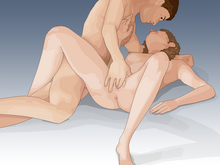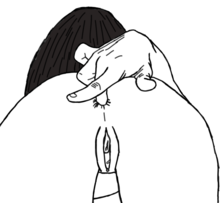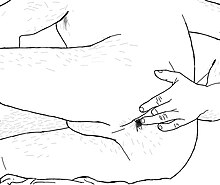Digital Penetration

When someone performs fingering on another person's vulva or vagina, it is a form of manual sex, and is analogous to a handjob (manual stimulation of the penis). It may be used for sexual arousal or foreplay, constitute an entire sexual encounter, or be used as non-penetrative sexual activity.

Fingering performed on one's own vulva or vagina is a form of masturbation.
Practice
The main aspect of fingering, whether performed on oneself or performed on someone else, is manual stimulation of the vulva by rubbing with the fingers, insertion of the fingers into the vagina through its opening, or some combination.
Vulva
Parts of the vulva, especially the clitoris, are erogenous zones. Massage of the vulva, and in particular the clitoris, is the most common way for a woman to achieve an orgasm. Studies indicate that 70–80 percent of women require direct clitoral stimulation to achieve orgasm.
The clitoral glans or shaft may be massaged by one or more fingers, usually through the skin of the clitoral hood, using up-and-down, side-to-side, or circular motions. The rest of the vulva such as the labia are also stimulated by fingering. The fingers may caress the labia minora (the vulva's inner lips) via up-and-down/side-to-side movements as well or tug on the folds.
Vagina
While the vagina is not especially sensitive as a whole, its lower third (the area close to the entrance) has concentrations of nerve endings that can provide pleasurable sensations when stimulated during sexual activity.
Fingering the vagina is often performed to stimulate an area termed the G-spot. The G-spot is reportedly located roughly five centimeters (2.0 inches) up on the anterior wall of the vagina, forwards toward the navel. It is described as being recognized by its ridges and slightly rougher texture compared to the more cushion-like vaginal cavity walls around it. Fingering this spot, and in effect possibly stimulating the Skene's gland, is commonly cited as a method that may lead to female ejaculation.
Some women have cited the "come hither" approach as a significant catalyst to orgasm. This technique involves the middle finger, sometimes additionally the index or ring finger, making a hand gesture like "come here" with the palm facing upwards towards her pubic bone. Medical professionals suggest washing the hands before contact with the vagina, to ensure proper hygiene, especially when moving between different orifices.
Anus


Anal fingering may be pleasurable because of the large number of nerve endings in the anal area, and because of the added stimulation gained from stretching the anal sphincter muscles while inserting the finger. A personal lubricant is advisable to both increase the pleasurable sensation and aid insertion. Some people prefer to simply stimulate the outer ring of the anus, while others will follow this by inserting one or more fingers into the rectum.
Fingering one's own anus is an act of anal masturbation while fingering the anus of another person is a type of manual and anal sex. Partnered anal fingering can arouse the receiver, either as an act in itself or allowing them to relax their anus and prepare them for the insertion of a penis or any other sexual instrument.
Anal fingering is an effective way of stimulating the prostate in males and can also stimulate the perineal sponge in women.
Safety and sexual assault
This section needs expansion with: More details about the relative safety and risks of fingering. You can help by making an edit requestadding to it . (June 2023) |
Consensual fingering is generally considered safe sex.
How digital penetration without consent is legally classified depends on the jurisdiction. For example, penetration of the vagina or anus with a finger without consent is rape in Australia, and forcible rape in many United States jurisdictions. In Scotland, the term rape is only used for penetration with a penis, whereas penetration with a finger can be "sexual assault by penetration".
Lesbian women often clip their nails in a particular fashion to allow for digital penetration, leading to recognition of shorter nails on the index and middle finger as a public LGBT symbol.
See also
References
- ^ Rathus SA, Nevid JS, Fichner-Rathus L (2005). Human sexuality in a world of diversity. Allyn & Bacon. p. 275. ISBN 0205406157. Archived from the original on 26 February 2023. Retrieved 6 August 2019.
- ^ "Understanding the Concept of Digital Rape".
- ^ Winks C (1997). The New Good Vibrations Guide to Sex. Cleis Press. p. 132. ISBN 1573440698. Archived from the original on 26 February 2023. Retrieved 6 August 2019.
- ^ Bruess CE, Schroeder E (2013). Sexuality Education Theory And Practice. Jones & Bartlett Publishers. p. 151. ISBN 978-1449649289. Archived from the original on 26 February 2023. Retrieved 6 August 2019.
- ^ Winks C (1997). The New Good Vibration Guide to Sex. Cleis Press. pp. 57, 60. ISBN 1573440698. Archived from the original on 26 February 2023. Retrieved 6 August 2019.
- ^ Upton D (2014). Nursing & Health Survival Guide: Health Promotion. Routledge. p. 52. ISBN 978-1317906179. Archived from the original on 26 February 2023. Retrieved 6 August 2019.
- ^ O'Connell HE, Sanjeevan KV, Hutson JM (October 2005). "Anatomy of the clitoris". The Journal of Urology. 174 (4 Pt 1): 1189–95. doi:10.1097/01.ju.0000173639.38898.cd. PMID 16145367. S2CID 26109805.
- Mascall, Sharon (11 June 2006). "Time for rethink on the clitoris". BBC News. Archived from the original on 4 November 2022. Retrieved 19 August 2010.
- ^ Weiten, Wayne; Dunn, Dana S.; Yost Hammer, Elizabeth (2011). Psychology Applied to Modern Life: Adjustment in the 21st Century. Cengage Learning. p. 386. ISBN 978-1-111-18663-0. Archived from the original on 26 February 2023. Retrieved 5 January 2012.
- ^ Marshall Cavendish Corporation (2009). Sex and Society, Volume 2. Marshall Cavendish Corporation. p. 590. ISBN 978-0761479079. Archived from the original on 26 February 2023. Retrieved 17 August 2012.
- ^ Kammerer-Doak, Dorothy; Rogers, Rebecca G. (June 2008). "Female Sexual Function and Dysfunction". Obstetrics and Gynecology Clinics of North America. 35 (2): 169–183. doi:10.1016/j.ogc.2008.03.006. PMID 18486835.
Most women report the inability to achieve orgasm with vaginal intercourse and require direct clitoral stimulation ... About 20% have coital climaxes...
- ^ Mah, Kenneth; Binik, Yitzchak M (7 January 2001). "The nature of human orgasm: a critical review of major trends". Clinical Psychology Review. 21 (6): 823–856. doi:10.1016/S0272-7358(00)00069-6. PMID 11497209.
Women rated clitoral stimulation as at least somewhat more important than vaginal stimulation in achieving orgasm; only about 20% indicated that they did not require additional clitoral stimulation during intercourse.
- ^ Carroll, Janell L. (2009). Sexuality Now: Embracing Diversity. Cengage Learning. pp. 118, 252, and 264. ISBN 978-0-495-60274-3. Archived from the original on 26 February 2023. Retrieved 23 June 2012.
- ^ Griffitt, William; Hatfield, Elaine (1985). Human Sexual Behavior. Scott, Foresman. p. 285. ISBN 978-0-67315-057-8. Retrieved 13 September 2023.
- ^ Greenberg JS, Bruess CE, Conklin SC (2010). Exploring the Dimensions of Human Sexuality. Jones & Bartlett Publishers. p. 126. ISBN 978-9814516785. Archived from the original on 26 February 2023. Retrieved 9 August 2019.
- ^ Rabinerson D, Horowitz E (February 2007). "[G-spot and female ejaculation: fiction or reality?]". Harefuah (in Hebrew). 146 (2): 145–7, 163. PMID 17352286.
- ^ "Pussy Fingering". Sex Project. Archived from the original on 26 June 2017. Retrieved 19 August 2010.
- ^ Pauli, Michelle (2021). Press Here! Kama Sutra for Beginners: A Couples Guide to Sexual Fulfilment. Fair Winds Press. pp. 48–49. ISBN 978-0-76037-047-6. Retrieved 16 September 2023.
- ^ "The male hot spot — Massaging the prostate". Go Ask Alice!. 27 September 2002. Archived from the original on 16 August 2015. Retrieved 21 April 2010.
- ^ Rosenthal, Martha (2012). Human Sexuality: From Cells to Society. Cengage Learning. pp. 133–135. ISBN 978-0618755714. Archived from the original on 26 February 2023. Retrieved 17 September 2012.
- ^ Komisaruk, Barry R.; Whipple, Beverly; Nasserzadeh, Sara; Beyer-Flores, Carlos (2009). The Orgasm Answer Guide. JHU Press. pp. 108–109. ISBN 978-0-8018-9396-4. Retrieved 6 November 2011.
- ^ Henry, Nicola (27 March 2018). "Rape, sexual assault, and sexual harassment: what's the difference?". The Conversation. Archived from the original on 16 September 2020. Retrieved 22 September 2020.
- ^ "An Updated Definition of Rape". The United States Department of Justice Archives. 6 January 2012. Archived from the original on 3 December 2021. Retrieved 22 September 2020.
- ^ "Facts about sexual violence". Rape Crisis Scotland. Archived from the original on 28 November 2020. Retrieved 22 September 2020.
- ^ "Rape and sexual assault". Victim Support Scotland. Archived from the original on 27 February 2021. Retrieved 22 September 2020.
- ^ Wallace, Megan. "Lez nails: Is the 'queer woman with short nails' an outdated stereotype?", Dazed Beauty, 17 October 2022. Retrieved 27 June 2024.
- ^ Thompson, Martine. "Cheers to the Queer Manicure", Los Angeles Times, 22 June 2022. Retrieved 27 June 2024.